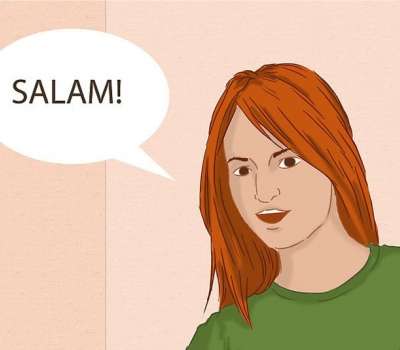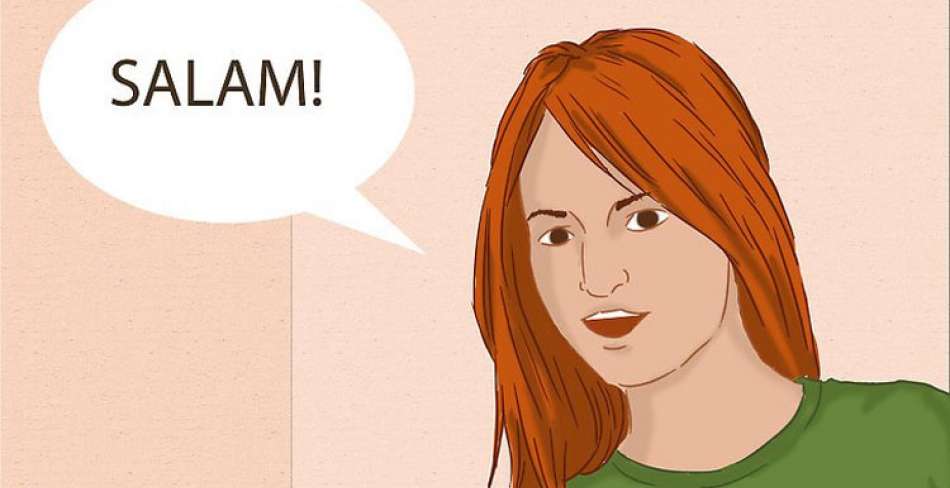

The first point about the language of the people in Iran you must know is the language itself. So it is important to know that Iranians speak Persian or Farsi. Iranians are famous among tourists to be friendly and hospitable; however, to find out their true hospitality, it is enough to know a few Persian phrases and when they greet you in the street, respond them in Persian and see how they will be excited that you know their language even too little. Knowing Persian, even so little, will help you make friends people easier as they will see you trying to speak Persian and even they will try to teach you some more Persian words and will be patient with you to learn the correct pronunciation. It makes them have a sense of family with you and stimulates them to do everything for you and make you have an enjoyable travel much more than what you imagine. The written alphabet of Persian, an Indo-European language, is based on the Arabic alphabets written from left to right and the numbers on price tags, menus, et. are written from left to right. Thus, let’s learn some of the most frequent and useful Persian expressions used every day language
Persian Phrases for Greetings or Making Friends
Let’s start with greetings. Iranians start their conversation saying hello equivalents.
Salaam or Dorood
Salam or Dorood means Hello/ Hi. Iranians say “Salaam” when seeing each other almost in every situation, whetehr face to face, on the phone, chatting, or even in formal letters. Saying “hello” is considered a polite behavior. “Doroud” is the literary and authentic version of the word “Salaam” which is used much less than “Salam” just in some specific situations for example by the literary people or some of the young ones (Although Salaam is borrowed from Arabic and Dorood is from Persian root, Salaam is more common).
Chetori?, Halet Chetore?, Khoubid?, Chetorid?, Haletun Chetore?, Khoubi??
These expressions are used as greeting and are regarded as Persian equivalents for How are you? In English. These expressions can be used interchangeably while some of them an make minor differences. As an example, we use “Chetori?”, “Halet chetore?” or “Khobi?” to greet a friend, while we use to “Khoubid?”, “Haletoon chetore?”, or “Chetorid?” whether to greet a greet or to show respect in formal situation. Khobi? and Khoubid are literal equivalents for “Are you OK?”; however, “Haletoon chetore?”, “Chetorid?”, “Chetori?” and “Halet chetore?” are more exact equivalents for “How are you?”.
Thanking words: Merci , Mamnoon , Tashakor, Sepas
Mamnoon, Merci, Sepas, Tashakor, and Dast e shoma dard nakone are the expressions used to thank others in Persian. These thanking word like greeting words can be used interchangeably with minor differences. Tashakor, Sepas, are more formal and Merci, Mamnoon, and Dast e shoma dard nakone are less formal.
Baleh means Yes, Na means No
The most common words are Baleh (yes) and Na (no) indicating you are accepting or rejecting something. A less formal form of Baleh is Areh which is more equivalent to Yeah.
Bebakhshid
Bebakhshid is both used to attract attention and permission as well as for forgiveness. However, excuse me is used to attract attention and permission and sorry is used to ask for forgiveness.
Khosh Bakhtam
When you meet someone new or someone is introduced to you, you say Khosh Bakhtam which is equivalent to Nice to meet you in English.
Sobh Be Kheyr, Shab Be Kheyr, and Vaght Be Kheyr
These three expressions can be used either at the beginning or at the end of the conversations. The expression “Vaght Be Kheyr” literally means “have a good time” with a difference that can be also used at the beginning of the conversation and for all parts of a day. Sobh Bekheyr is Good Morning in Persian and is more often used at the beginning of the conversation. Shab Bekheyr is equivalent for good evening as well as good night, used both at the start and end of the conversation.
Man Ahle ___ Hastam
As Iranian are keen to know new people, especially from other parts of the world, and make friends with them, you will frequently hear much the questions like “Ahle Koja-e” or “Kojaie Hasti” which means “where are you from?”. You can say “Man Ahle ___ Hastam”, I’m from ___, as the answer.
Khoda Hafez and Felan
Khoda Hafez literally means May God Keep you safe and it is equivalent to Goodbye. Khoda Hafez is used in both formal and informal situations. Felan /felᵆn/ means Bye for now or Talk to you soon and it is used in informal situations.
Befarmaaid
Befarma’ied is widely used in different situations and can have different meanings; however, in all situations with its all meanings, it is a sign of politeness and respect to your addressee. When you are giving something to someone to sit down, eat or drink something, or invite to go in a place, you say Befarmaaid. It becomes a little challenging for non-native people, but if somebody said Befarma’ied to you, try to guess its meaning observing the situation as generally it can mean please do it. Here are two examples of using Befarmaid: at a supermarket, when you are giving the notes to the salesperson, it is good to say Befarmaaid at the same time. Also when you are walking into a place with someone else, you can say Befarma’id meaning you first.
Taarof Nemikonam
Firstly, let’s talk about Taarof briefly. Iranians are culturally so polite and respectful. Taarof includes a series of social behaviors which usually could be described as posing false invitations and offers to others (whether strangers or relatives) and expecting them not to take the offer and keep declining it. In order to face it correctly, if you are offered something in Iran, it is recommended to decline it at first; however, if they keep on offering, you can accept it (the taarof can be any kind of invitation, paying bills, giving you a ride, and any other thing showing hospitality).
Supposing you know meaning of Taarof, the expression “Taarof nemikonam” is used when someone is insisting you to accept their offer which you may not like. So, you say “Taarof Nemikonam” to show you are serious in your declination and it is not the matter of taarof or shyness.
Persian Phrases for Shopping
Gheymatesh Chandeh? Or Chandeh?
Gheymatesh chandeh? Or just Chande? is used to ask about the price of something. It is much easier to say Chandeh? while you are pointing to the intended goods. These two expressions are proper equivalents for How much is it? Or how much does it cost?
Three bargaining expressions: Takhfif Bedid, Geroone, Akharesh Chand Midin?
When shopping, you may need to ask for discount. Discount in Persian is takhfif. The mentioned expressions, i.e. Takhfif bedid (literally means give me discount), Geroone (literally means it’s expensive), Akharesh chand midin? (literally mean how much is it finally?); are used to ask the salesperson for a discount.
Persian Phrases in A Restaurant
Restaurants are considered important places for travelers around the world to meet their eating needs. It is also important to be able to communicate with waiters to get the write food for you. Thus, knowing a little about the phrases by which you can make yourself clear is even more important and necessary. Following you can find some useful expressions.
Man Giaah Khaaram
Iranian dishes are almost delicious and it is really difficult to ignore them. Even more difficult, it is to find a dish without any kind of meat. Therefore, if you are a vegetarian or a vegan, you need to declare to the waiter at your table. To declare you are a vegetarian or vegan, Man Giaah Khaaram is the expression which you should tell to the waiter.
Kheyli Khosh Mazas
Kheyli khosh mazas means It’s Yummy! but when to use it. If you are invited in someone’s house, you can show your interest in the food by saying Kheyli khosh mazas, in respond to which you will probably hear Noosh e Jaan (Bon Appetite!)
Noosh e Jaan
While Bon appétit! is used before having your meal to wish you enjoy your meal, Noosh e Jaan the Persian expression used to wish you enjoy your meal with the difference that is said at the end of the meal or when someone in complimenting the food and it is responded with the thanking expressions such as Dast e shoma dard nakone.
Sier Shodam
Sier shodam means “I’m full”. As it was said earlier, Iranians do taarof to their guests to make sure that their guest is at ease having everything. So they may insist you as their guest to have more food or drink while you are full and cannot have anything more. So you can combine a thanking word and Sier shodam which expresses you are full, e.g. Merci Sier shodam.
Here are some Persian equivalents for the eating words:
| English Phrases |
Persian Equivalents |
| Restaurant |
Restoraan |
| Menu |
Meno |
| Drinks |
Nooshidani (nonalcoholic drinks) |
| Food |
Qazaa |
| Dinner |
Shaam |
| Lunch |
Naahaar |
| Breakfast |
Sobhaaneh |
| I'm hungry |
Gorosname (Goshname) |
| I'm thirsty |
Teshname |
To read more about Iranian Traditional cuisines and Traditional Persian foods for vegetarian and vegans, click on the links.
Persian Phrases for Finding an Address
If you are traveling in a tour, the probability to need to use address words and phrases is less than the time you are visiting on your own. The first interesting point is that address is address in Persian with the difference that a in address is pronounced /a/ in Persian. In the following table, we introduced the most frequently used expressions and phrases you may need:
| English Phrases |
Persian Equivalents |
| Where is ……? (Where is the Toilet?) |
…… Kojast? (Servis behdaashti kojaast?) |
| How can I get to ……? |
Chetor beram ……? |
| Boulevard (Blvd) |
Bolvar |
| Street (Azaadi Street) |
Khiyabaan (Khiyabaan-e Azaadi)
Khiyabaan is less formally and more frequently pronounced as Khiyaboon |
| Alley (Azaadi Alley) |
Kooche (Kooche-ye Azaadi) |
| I'm lost |
Man Gom Shodam |
Emergency Phone Numbers in Iran
It is wise enough to keep mind the emergency phone numbers whenever and wherever you are travelling. Following is a list of the emergency phone numbers such as police, medical services, and fire station, etc. in Iran:
- Police: 110
- Emergency medical services (Ambulance): 115
- Fire: 125
- Accident: 197
- Telephone Directory: 118
The point is that you need no code to dial wherever you are in the country.
The Persian Equivalents for Wh Words:
Find the equivalents for Wh words in the following table:
| English Phrase |
Persian Equivalents |
Example |
| What? |
Chi? |
What is that?
Oun chiye? |
| Why? |
Cheraa? |
Why is it expensive?
Cheraa geroune? |
| When? |
Kay? |
When do we come back?
Kay barmigardim? |
| Who? |
Ki? |
Who is she?
Oun kiye? |
| Where? |
Koja? |
Where is the hotel?
Hotel kojaast? |
| How? |
Chetor? |
How do we get to the hotel?
Chetori berim hotel? |
| What time? |
Saat chand |
What time is it?
Saat chande? |
Time in Iran
Knowing about the calendar of destination country is one of the essential things for traveling to a foreign country in order to make everything goes well based on your travel plan. It can make changes in different aspects of your trip. In this part, we speak about the Iranian calendar including seasons, months, days, etc.
Iranian official calendar is arranged based on the Solar year. So, 21st March is 1st Farvardin, beginning of Spring and Nowruz, that is the Persian New Year's Day.
It should be mentioned that the months of spring and summer include 31 days and those of autumn and winter include 30 days, while the last month, Esfand, includes 29 days (30 days in leap years). Here, you can find a table with detailed information to explain all about seasons and months according to the Persian calendar.
| Seasons |
Persian Seasons |
Persian Months |
Number of Days |
Equals to |
| Spring |
Bahar
بهار |
Farvardin
فروردین |
31 |
21 March to 20 April |
Ordibehesht
اردیبهشت |
31 |
21 March to 20 April |
Khordad
خرداد |
31 |
21 March to 20 April |
| Summer |
Taabestan (Tabestoon)
تابستان |
Tir
تیر |
31 |
22 June to 22 July |
Mordad
مرداد |
31 |
23 July to 22 August |
Shahrivar
شهریور |
31 |
23 August to 22 September |
| Autumn |
Paaeiz
پاییز |
Mehr
مهر |
30 |
23 September to 22 October |
Aban
آبان |
30 |
23 October to 21 November |
Azar
آذر |
30 |
22 November to 21 December |
| Winter |
Zemestaan (Zemestoon)
زمستان |
Dey
دی |
30 |
22 December to 20 January |
Bahman
بهمن |
30 |
21 January to 19 February |
Esfand
اسفند |
29/30 |
20 February to 20 March |
And of course according to the Iranian calendar, every week starts on Saturday and ends on Fridays, i. e. the working days are from Saturday to Wednesday and Thursday and Fridays are considered weekends in Iran. However, many non-state companies and stores count Thursdays as working days and are open for the whole day or half day, schools and most state organizations and departments are closed on Thursdays. The table below provides the weekdays in Iran.
| Days of the week in English |
Days of the week in Persian |
| Saturday |
Shanbe |
| Sunday |
Yek Shanbe |
| Monday |
Do Shanbe |
| Tuesday |
Se Shanbe |
| Wednesday |
Chahar Shanbe |
| Thursday |
Panj Shanbe |
| Friday |
Jom-e |
Also in Iran, as an Islamic country, Islamic events according to lunar calendar are counted officially and there are number of holidays according to these events. This can be important, especially because of the months the Ramadan and Muharram and the other Islamic occasions.
If you need more information on traveling to Iran, contact us at Raadina Support.













